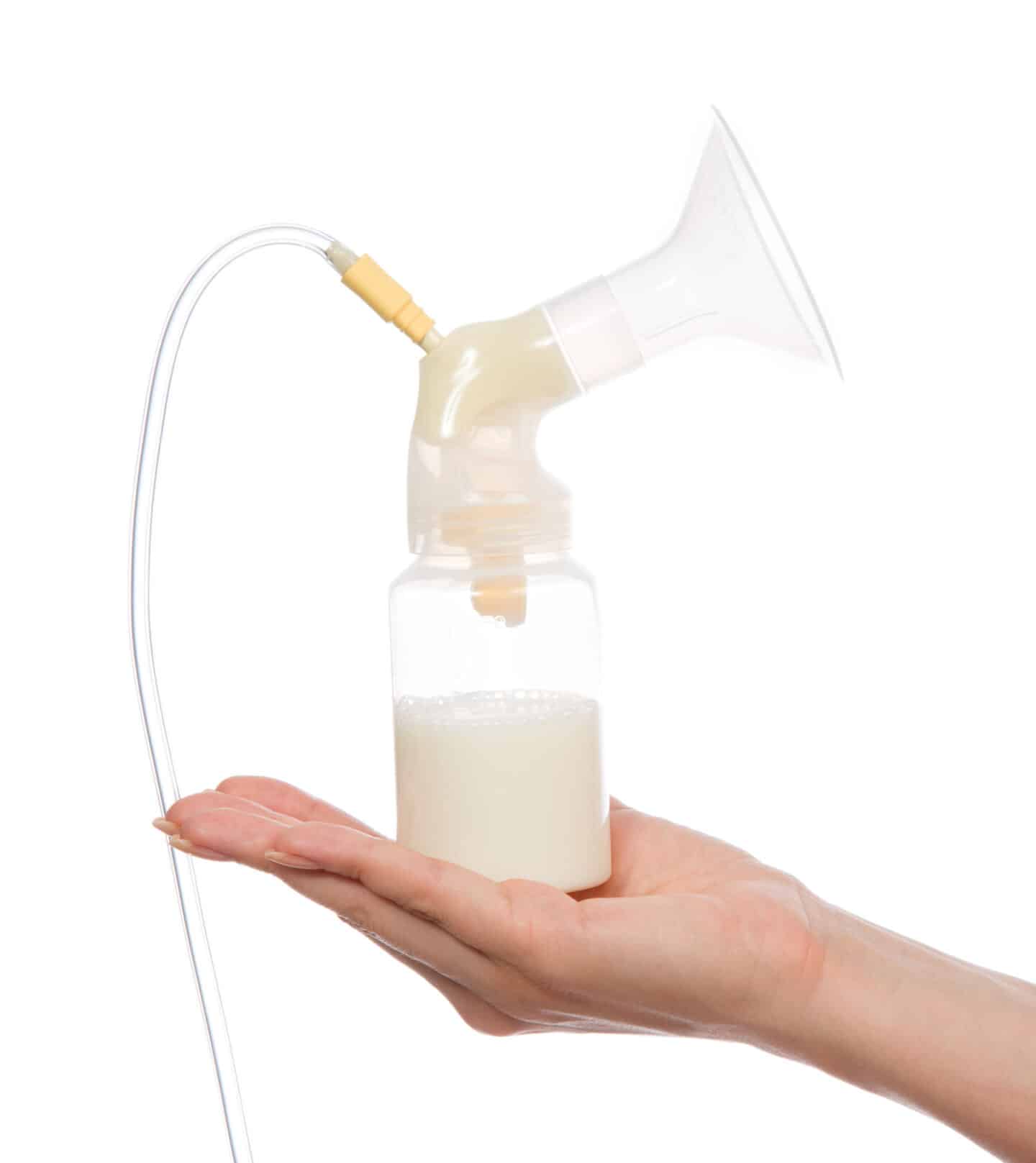
When you decide to breastfeed as a new mom your next big decision is how you will breastfeed.
Deciding whether to choose demand feeding vs. a schedule is up to some debate among both parents and doctors.
Breastfeeding is one of the most natural and beautiful things in the world, but it can quickly get complicated when you try to do what’s best for your baby, as well as what is right for you and your family.
Family and friends always have well-meaning advice which can sometimes confuse you even more.
So whether you choose to demand feed or to put your baby in a schedule is important, but there are some things to consider before you make a decision.
Breastfeeding is definitely natural but far from easy. Anything that can make breastfeeding easier and help you get on the right track from day one is definitely vital.
As a new mom – there is just SO much to know about breast feeding a baby!
From my experience, it’s a great idea to prepare for breastfeeding by taking, simple and affordable breastfeeding class.
I like the Milkology Course as it is run by a certified lactation educator, is video-based, and comes with a troubleshooting guide – that’s important.
Read my honest review on this online breastfeeding and pumping course here.

As an Amazon Associate I earn from qualifying purchases. The links below may be affiliate links. Please read my disclosure policy for more information.
The first few hours after birth
When your baby is first born it is recommended to breastfeed straight away.
The first hour after your baby is born is the magical hour after your placenta has been delivered, the levels of progesterone drops and the hormones that produce milk begin to work.
Your baby instinctively knows where your milk is and will begin to move towards your nipple, known as the ‘breast crawl.’
Related: How to Increase Breast Milk Supply in 48 hours
However, the longer your birth experience, the more likely your baby will be sleepy, and the breast crawl may not happen. If there is a C-section or 24-72 hours of induction of labor, the likelihood of this happening decreases
It is best at this point to feed your baby skin-to-skin. Which releases the powerful love hormone known as oxytocin this will help you and your baby bond.
It also helps your uterus contract to prevent excess blood loss.
After the baby is born, you will usually get a few hours alone together; use this time to keep baby on the breast.
Most US hospitals allow rooming in, which means the mother stays with the infant for the entirety of the hospital stay.
For others who do not get that in their institutions, may want to describe “keep baby skin to skin as long as possible, for ease of transition for the mother and infant.”
Related: How I lost over 50lbs on the Keto diet while Breastfeeding
What is on demand feeding and what are the benefits of on demand feeding?
On-demand feeding simply put is breastfeeding your baby when he shows signs that he is hungry.
Feeding on demand also means that you don’t watch how long it takes to breastfeed your baby; for example, only breastfeeding for 10 minutes on each side.
You allow your baby to feed until he is satisfied.
Ultimately it means you watch your baby, not the clock.
Related: Best Bassinet for Breastfeeding
How can you tell your baby is hungry?
Early Cues: look out for baby’s mouth. Usually at this stage baby will have mouth open, licking his lips or turning his head towards your breast if you hold him.
Mid cues: Now your baby is starting to get really hungry and is moving his body, this includes movements such as putting his fingers or whole fist in his mouth, stretching and wriggling.
Late cues: By this time your baby is really upset and probably needs to be calmed down before you may even be able to feed him. These signs include crying, being fussy and going red.
On-demand feeding is absolutely the best way to feed your baby in the early days, weeks, and months.
Don’t worry, it won’t last forever. As time goes on, your baby is more likely to start making his own schedule. Try not to force him to eat until he is ready. This can cause excess stress for both mom and baby and can decrease milk supply due to increased stress.
Related: Does a Tongue Tie mean Breastfeeding Problems for your baby?

On demand feeding will produce the right amount of milk for your baby.
Following the birth of your baby, putting a baby to breast as soon as you see his early hunger cues is excellent for bringing in your full milk supply.
The more you put the baby on your breast to nurse, the better your milk supply will be.
One thing that I constantly worried about with my first baby was whether he was drinking enough milk, so by feeding him whenever he wanted, made me feel at ease, knowing that he was getting the right amount of milk.
If I had baby on a schedule, how would I know if he had enough to drink in one feeding session to keep him feeling full until the next feed?
Each mom also has a different amount of storage in her breasts, and babies will drink different amounts of milk each time, no two days will be the same.
Some new moms think that if they wait to nurse, their breasts will ‘fill up,’ helping their milk supply to increase.
They also think that their baby will also drink more as there is more milk is in their breasts.
It’s actually the opposite of that principle. Waiting too long to nurse or delaying breastfeeding can slowly reduce your milk supply.
Your breasts are getting signals to say your baby really doesn’t need that much milk so the body will start to produce less because the overfilled breast sends the signal that you must need less milk.
Related: Can You Overfeed a breastfed baby?
Convenience of on demand feeding
For many moms who breastfeed on demand, the convenience and freedom is a big benefit.
If you’re home with your baby and have flexibility in your schedule, then you don’t have to worry about watching the clock all day.
You can allow your new baby to feed whenever he or she feels it’s time, so your days simply flow easily and naturally.
In the first year of my baby being born, I traveled abroad twice.
It was great to just be able to feed my baby whenever he wanted.
The second time we traveled he was already eating solids, however on the airplane he didn’t want to eat and only wanted to be breastfed.
By allowing him to tell me what he wanted I was able to not only feed him but to also comfort him on this journey.
Related: 10 ways to relieve clogged milk ducts FAST!
Breastfeeding is more than just food
Breastfeeding is about so much more than eating. It involves lots of hormones that promote bonding with your baby.
It benefits the physical, neurological, and emotional growth of your child.
Breastfeeding is a great way to comfort your baby when they are upset.
This means it’s much easier to calm and stop them crying as much.
How you respond to your baby’s needs also lets your baby develop early communication skills.
It’s the building blocks to teaching them how to interact with other people and are skills for life.

Breastfeeding on demand may encourage healthy habits for life
Feeding on demand allows a baby to learn the difference between feeling hungry and full.
This means your baby will trust their body’s judgment on calorie intake.
It may form the basis for healthy eating habits later – he learns to eat when she’s hungry, not according to a schedule.
Starting from an early age helps your baby to strengthen this ability.
With obesity becoming an epidemic amongst children, promoting positive eating behavior is essential.
Related: The Best Pacifiers for Breastfed Babies
On demand feeding improves development
When a baby’s needs are not met their brain releases a stress hormone called cortisol.
Studies have shown that prolonged periods of cortisol can lead to poor development.
This includes mental and physical development in children.
The oxytocin which is released during frequent breastfeeding is an antidote to the cortisol.
As we’ve mentioned above, it encourages strong bonds and emotional support and communication.
A baby who feels safe and secure will flourish better than a baby who feels the need to fend for themselves.
Concerns about on demand feeding.
Although on demand feeding is best for you and your baby there are some things you have to take into account.
During the first few weeks some babies are very tired and do not wake up by themselves.
My first son was a very sleepy baby, as a new mom I thought he was breastfeeding successfully and full, hence why he was sleeping so much.
When he would sleep for long stretches I was told by family and friends that he was full and you should never wake a sleeping baby.
It was on day 9 postpartum that he was extremely lethargic and wouldn’t wake up.
We were admitted to the hospital as he had lost too much weight, he was tube fed until I could pump breast milk for him.
This was because he had a poor latch. It is ideal to see a lactation specialist in a hospital or within 4 days of birth, to ensure the infant is feeding effectively
In the first few weeks, some babies are very tired and do not wake on their own, they should wake on their own to feed between 8 – 12 times although it is generally more than that.
This is most common for babies born prematurely, Babies that have a poor latch, born early, or have jaundice may have difficulty gaining weight.
And may be excessively sleepy with feeds. These are indications to see a lactation expert soon as these are detected.
Related: Learn how to Exclusively Breast Pump like a Pro in Just 90 Minutes
Some weight loss is normal after baby is born.
However, to help babies get back to birth weight by 2 weeks of life, we recommend that parents wake their babies to feed at least every 3 hours during the day and at least every 4 hours at night for the first few weeks.
If your baby is back to birth weight by two weeks, then you can continue to demand feed as normal.
Baby wants to breastfeed again soon after
When you demand feed your baby, he will take as much milk as he wants.
You may find that you have breastfed your baby and soon after he wants to be fed again.
This is normal and your baby should be fed.
I would have comments telling me my baby couldn’t possibly be hungry as I had just nursed him and that I was spoiling him.
If you get comments about ‘spoiling your baby’ each time you pick them up and feed them, pay no attention.

You can’t spoil a newborn. If your baby cries because he wants to be fed, then go ahead and feed him again.
For the first 6 weeks of life, cluster feeding from 8 pm -2-4am is normal.
Babies eat more at night to ensure they are able to sleep longer as they grow.
Their brain is unable to go longer between feeds until 6 weeks, or longer.
Infants’ stomach size at this age is about the size of a chicken or duck egg.
Babies eat frequently because breastmilk is highly digestible.
Infants will empty their stomach contents quickly due to the small size and moves through the gut swiftly.
Related: How to Make Breastmilk Lotion
How often should I breastfeed my baby when I feed on demand
With demand feeding, you have to remember that your baby is the expert when it comes to how often they want to eat.
What’s normal for one mom may not be normal for you and your baby.
If your baby is reaching his milestones, diapers are wet, passing stools and is happy and healthy you shouldn’t be concerned.
If your baby is gaining weight at a good rate, then you can rest assured that your baby is thriving with breastfeeding.
Also, keep an eye on your baby’s diapers as an indication of how well breastfeeding is going.
In the first few weeks of life, your baby may have two to four dirty diapers and up to six wet diapers each day.
Beyond the first month of life, you should notice a pattern in your baby’s bowel movements.
Some babies have just one per day while others are more ambitious with their output. Most babies will deliver at least six wet diapers each day, but this too can vary with age.
If the diaper has rust stains in it, and you get 3-4 wets a day, and the baby has more sleeping than eating; this could mean the baby is dehydrated and may need medical attention.
Generally newborn babies tend to will demand a feed every two hours. You should expect to breastfeed at least eight times each day, but it’s not likely to occur like clockwork.
Related: 14 of the Best Breastfeeding Snacks.
Your baby may want to feed every 1 hour one day while sleeping for a surprising three-hour stretch the next.
Your little one may not seem to notice the difference between night and day for the first few months or so, but eventually, that should change.
As your baby becomes more alert and spends more time interacting with you and other loved ones, he or she should gradually start sleeping more during the night.
You can also expect some growth spurts along the way, and your little one may simply need more comfort and closeness at times.
Your baby may suddenly start demanding more breastfeeding sessions, or they may feed for longer periods of time.
Rest assured, this will eventually calm down as your baby settles back into a more reasonable breastfeeding schedule.
The fact that you’re able and willing to meet your baby’s demand for more milk at those times is remarkable.
How long should I breastfeed my baby?
There is no hard or fast rule for how long each breastfeeding session should last. You may have heard that your baby must continue feeding until both of your breasts are empty, but he may not always need that much milk.
In general, breastfeeding sessions tend to last anywhere from 10 to 50 minutes. Some babies are more efficient at extracting the milk from the breast and will get what they want in less time.
If the baby is consistently eating for 40min+ and is more sleeping than actively swallowing, the baby is not eating well.
A lactation visit would be needed. If mom states “I am feeding all the time” and unable to ever put the baby down due to fussiness and excessive hunger signs, this could be an indication baby is not actively eating.
If baby isn’t swallowing he is not eating and needs a lactation expert visit
There are other times when they will take longer, or may just need a cuddle than a full feed.
Just as with how often you should be feeding, don’t worry and time the amount of time it takes to nurse as long as your baby is thriving that is what matters.
Related: A Sudden Drop in Milk Supply? Here’s what to do.
How do I know baby is full?
It can be confusing to know when a baby’s had enough.
Some good cues are a baby who unlatches from the breast and doesn’t try to get back on.
Or a baby that falls asleep at the breast and feels very relaxed and loose when you lift their arm.
My baby is breastfeeding all night
Families would like infants to sleep through the night. Their brain is scientifically immature and needs to wake often to feed.
Studies show infants that wake up at night and breastfeed have a lower chance of SIDs rates than infants who sleep 6-8 hours from the beginning.
It’s important to realize that it’s completely normal for breastfed babies to wake frequently during the night.
It’s unusual for a healthy newborn to go more than 4 hours without a feed at night, so expect to do at least one night feed.
When you are breastfeeding it’s best to room share with your baby so you can recognize feeding cues overnight.
Related: The Ultimate Guide to Travelling with Breast Milk
Will I have to feed on demand forever?
The short answer…it depends on your child.
My daughter ate every 1.5 hours until I stopped breastfeeding at 24 months.
Even when solids were introduced she would still drink every two hours.
One of my sons however naturally fell into a type of schedule and had a pretty consistent routine.
Generally, by 6 months, babies fall into a pretty regular pattern of eating and sleeping that can be rather predictable if not disrupted too often.
At about this same time, you will likely start introducing some solid foods into his diet.
You may not have much choice over how long they prefer your breast to those foods, and some babies will naturally wean over time.
How long you allow this to happen will depend on your baby’s personality and lifestyle.
Related:
- Why is One Breast Producing Less Milk?
- What Happens to Your Body When You Stop Breastfeeding?
- What happens if your baby drinks spoiled breast milk
- What determines the fat content in breastmilk?
- The truth about Body Odor while Breastfeeding.
Breastfeeding on demand tips.
1.Watch the baby, not the clock, look out for cues.
2. Wake baby up if he hasn’t fed in the last 3 hours.
3. Make sure in the early stages you keep baby on long enough to get the rich creamy hindmilk. As they get older they get quicker and more efficient and getting mommy’s milk.
4. Sometimes a baby will want to nurse for comfort as being nursed is not only for nutrition purposes.
What is scheduled feeding?
Should `I put my baby on a schedule when breastfeeding?
There are many reasons why a parent would choose to put their breastfed baby on a schedule, These include:
Returning to work: Getting your baby into a feeding schedule is a good idea if you are returning to work as this will be easier for the person taking care of your child.
Having a long school run twice a day: I had to make sure the baby was fed literally just before we left for school. This ensured that he was not left hungry for too long.
Babies easily adapt to feeding schedules but that can change during a growth spurt, teething or when they are sick.
Related: Moms Ultimate Guide: Foods To Avoid while Breastfeeding
This is when your mummy intuition will come into play and you will need to decide what to do.
There is no judgment here you just have to do what is right for your baby and your family.
I had to have my baby fed by 2:45 pm every day otherwise he would be hungry until I got home at 4 pm from my very long school run.
This was the solution to my own family situation.
Just as many new moms consider on demand feeding the best for them, there are some women who function better when they have a daily routine.
Not all women have complete flexibility of their schedules for a variety of reasons.
Scheduled feeding may work for moms who work from home or moms who will need to return to work.
The idea of their baby adjusting their feeds to fit in with the new work schedule would make it easier.
While on demand feeding works great with baby number one, things may change as you have more children and life gets busier.
However, babies who are later in birth order often tend to adapt early to busy family life.
It also doesn’t always have to be one way, there could be a mix of demand feeding and scheduling
You may allow your baby to feed on-demand for a set period of time, paying attention to patterns that will naturally occur.
Related: Is my baby getting enough Breast Milk?
That is always best at the newborn stage.
You can then use those natural cues from your baby to develop a schedule that feels at least somewhat natural to him.
You could both end up getting what you need even if you aren’t strictly feeding without a schedule.
As mentioned earlier, you have to do what works best for your family; you may mix both options after the first few weeks.
For instance, if you know that you have to leave every day at 3 pm to pick up the children from school, you may choose to feed your baby as close to the time you need to leave.
Related: Breastmilk Storage Guidelines made Simple.
Conclusion
During the early weeks of breastfeeding, you may feel as though you’re nursing your baby constantly, and wonder if your baby really needs all that breast milk.
Newborn babies have tiny stomach, breast milk which also digests very quickly fills their stomach and is absorbed, so it’s no wonder they need to eat again relatively soon.
If your baby seems hungry soon after eating, go ahead and feed him again. Keep in mind, too, that babies are just hungrier on some days than on other days and will want to eat more than usual, as they may be going through a growth spurt.
While being aware and responsive to your baby’s cues to feed,also be aware that some very young babies don’t yet have the strength to wake up and demand to be fed. A newborn that regularly sleeps longer than three to four hours needs close monitoring to make sure he gains enough weight.
Benefits of feeding on demand include;
1.Convenience
2. Saves time (no scheduling)
3. Gives more control to the baby
4. Caters to individual needs of the baby
5. Adjusts to baby’s needs through growth spurts automatically.
6. Natural control of milk production
7. Comfort & security on demand
8. Faster baby weight gain
9. Improved cognitive benefits long term
The problem with feeding schedules that have developed over the few decades is when formula feeding was a more popular feeding choice for the masses.
The need for newborn babies to sleep longer through the night and feed in a pattern is a modern day need. In fact, it’s harmful to breastfeeding.
Breastfeeding on demand offers more benefits than having a baby who nurses on an schedule.
References:
Klaus M. Mother and infant: early emotional ties.Pediatrics. 1998;102(Supplement E1):1244-1246.
